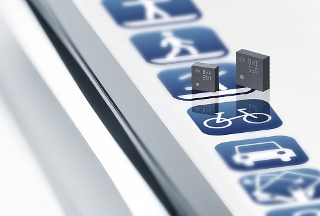Mar 11 2015
Bosch Sensortec today announced the BHI160 and BHA250, two sensor devices with integrated sensor hub. Today's smart phones rely on always-on sensors for applications such as fitness tracking, step counting, indoor navigation and gesture recognition.
By offloading sensor processing to the BHI160 or BHA250, as well as buffering sensor data locally on the devices, system designers can ensure the main application processor is never woken up just to process sensor data. This significantly reduces system power consumption, and thus extends battery life - a major competitive advantage for phone manufacturers.
 Bosch Sensortec launches MEMS sensors with integrated microcontroller for Android smart phones. BHI160 and BHA250 integrate lowest power sensor hub and sensors.
Bosch Sensortec launches MEMS sensors with integrated microcontroller for Android smart phones. BHI160 and BHA250 integrate lowest power sensor hub and sensors.
The new devices integrate a best-in-class 3- or 6-axis MEMS sensor with the new Bosch Sensortec DSP "Fuser Core". The BHI160 and BHA250 are specifically designed for applications in Android smart phones - implementing the full Android Lollipop sensor stack inside the devices where they provide a flexible, low power solution for motion sensing and sensor data processing.
The new devices implement the full Android Lollipop sensor stack and can be updated with new software features to support future releases. The BHI160 is the industry's lowest-power solution that is fully compatible with Lollipop, using less than 1.55 mA for a complete 9-axis solution including the Fuser Core, the integrated accelerometer and gyroscope and an external magnetometer.
"In modern smart phones, sensors are a key component, and are often switched on all or most of the time for motion-sensitive applications," says Dr. Stefan Finkbeiner, CEO of Bosch Sensortec. "By handling all sensor data processing, these new devices can make a substantial difference to overall battery life."
The sensor hub devices are a full turnkey solution, reducing integration work and hence cutting time-to-market for OEMs.
Power-efficient core
The Fuser Core is a 32-bit microcontroller that is optimized to execute Bosch Sensortec's sensor fusion and activity-recognition algorithms with ultra-low power consumption. It uses significantly less power than standard microcontrollers, with a saving of up to 95 percent compared to Cortex M0 and up to 90 percent compared to Cortex M4 based devices.
The BHI160 and BHA250 both offer identical functionality except that the BHI160 integrates a 6-axis inertial measurement unit (IMU), consisting of a 3-axis gyroscope and 3-axis accelerometer, while the BHA250 omits the gyroscope. This makes it a smaller and lower-cost device, and gives OEMs the flexibility to use it in eCompass applications where a gyroscope is not required.
Compact package
The BHI160 is available in a 3.0 x 3.0 x 0.95 mm³ LGA package, while the BHA250 is provided in a 2.2 x 2.2 x 0.95 mm³ LGA package. These packages are the same size as competitive sensor-only devices without an integrated DSP. Integrating the sensor hub reduces the bill of material, and saves on valuable PCB space compared to solutions based on standard microcontrollers.
Both new devices are fully pin- and footprint-compatible with Bosch's sensor-only variants from Bosch Sensortec, giving OEMs the flexibility to support multiple different smart phone devices on one platform, and to make decisions later in the design cycle.
Availability
Samples are scheduled to be available to selected customers in the second quarter of 2015.
Press photo: 1-BST-20813; 1-BST-20814
Video: https://www.youtube.com/watch?v=GQhTHugW9wo